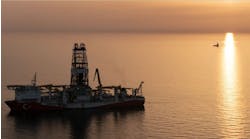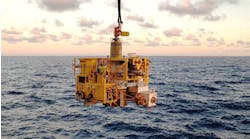William Furlow
Editor-in-chief
A recent report from Jim Wicklund at the Bank of America offers further evidence that deep wells on the Gulf of Mexico's continental shelf will lead the charge in offshore recovery next year. Driven by royalty relief incentives, independent operators will be putting larger jackup rigs to work drilling for gas below that magic 15,000-ft mark.
With the financial incentives in place, an abundance of rigs capable of drilling such wells, and stable gas prices, it will be interesting to see if the US Minerals Management Service has succeeded in revitalizing the Gulf. The results could be pretty quickly realized as smaller operators move fast to take advantage of the favorable conditions.
Shallow-water drilling lacks many of the barriers of entry seen in deepwater projects. Deepwater exploration can be very expensive. The leases themselves sell for a premium. To drill in such water depths requires specialized rigs, and although there have been many large finds, it takes even more time and money to bring these projects on line and produce a revenue stream to cover exploration costs. To succeed in deepwater, operators have to take a long-term approach. This demands a level of strategic and financial commitment that can tax the resources of even the super-majors.
In a sense, the high level of commitment required for deepwater E&P ensures a certain level of stability. Operators are not likely to quickly pull out of deepwater because they have made such a substantial investment there. By the same token, it would be unlikely to see a huge rush to deepwater by smaller operators because of the high risk.
On the other hand, shelf drilling is much less expensive. It is relatively easy to fund an exploration program on the shelf. The risks are lower and so are the rewards.
One of the reasons independents are having such a fine time on the shelf is that the majors, across the board, chose to divest their on-shelf properties, for the most part, in order to focus on deepwater. While it's true that some of the larger independents have had success in deepwater, the majority of the smaller players will limit their participation to shelf drilling. The departure of the majors left a variety of attractive prospects for the independents to explore. Controlling costs and developing expertise in these on-shelf environments, many smaller operators have had great success exploring and developing prospects that don't interest the majors.
With royalty relief driving them, some of the independent companies have the confidence they need to drill deeper, more expensive wells. While such wells may be more complex than many of the smaller operators are used to, drilling on the shelf, using readily available jackup rigs, and looking for gas is in line with their core competencies.
If some of these deep shelf wells become discoveries, it may lead to the type recovery the Bank of America mentions. With plenty of infrastructure in place to handle the new production, it would appear that all the factors are now in place. Could it be just a matter of time before the shelf eclipses the deepwater in terms of new activity?


